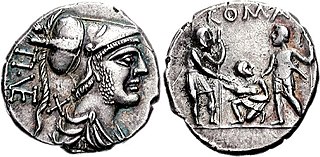Related Research Articles

The gens Atilia, sometimes written Atillia, was a plebeian family at ancient Rome, which rose to prominence at the beginning of the fourth century BC. The first member of this gens to attain the consulship was Marcus Atilius Regulus, in 335 BC. The Atilii continued to hold the highest offices of the state throughout the history of the Republic, and well into imperial times.

The gens Quinctia, sometimes written Quintia, was a patrician family at Rome. Throughout the history of the Republic, its members often held the highest offices of the state, and it produced some men of importance even during the imperial period. For the first forty years after the expulsion of the kings the Quinctii are not mentioned, and the first of the gens who obtained the consulship was Titus Quinctius Capitolinus Barbatus in 471 BC; but from that year their name constantly appears in the Fasti consulares.
The gens Quinctilia, also written Quintilia, was a patrician family at Rome, dating from the earliest period of Roman history, and continuing well into imperial times. Despite its great antiquity, the gens never attained much historical importance. The only member who obtained the consulship under the Republic was Sextus Quinctilius Varus in 453 BC. The gens produced numerous praetors and other magistrates, but did not obtain the consulship again for over four hundred years.
Opiter is a Latin praenomen, or personal name, which was used primarily during the early centuries of the Roman Republic. It is not usually abbreviated, but is sometimes found with the abbreviation Opet., apparently based on an archaic spelling of the name. No examples of a feminine form used as a praenomen are known, but from a cognomen it appears to be Opita. The name gave rise to the patronymic gens Opiternia, and perhaps also gens Opetreia.
The gens Menenia was a very ancient and illustrious patrician house at ancient Rome from the earliest days of the Roman Republic to the first half of the fourth century BC. The first of the family to obtain the consulship was Agrippa Menenius Lanatus in 503 BC. The gens eventually drifted into obscurity, although its descendants were still living in the first century BC.

The gens Veturia, originally Vetusia, was an ancient patrician family of the Roman Republic. According to tradition, the armourer Mamurius Veturius lived in the time of Numa Pompilius, and made the sacred ancilia. The Veturii occur regularly in the Fasti Consulares of the early Republic, with Gaius Veturius Geminus Cicurinus holding the consulship in 499 BC. Like other old patrician gentes, the Veturii also developed plebeian branches. The family declined in the later Republic, with the last consular Veturius holding office in 206 BC, during the Second Punic War.
The gens Calavia was a distinguished Campanian family of Roman times. Several members of this gens were involved in the events of the Samnite Wars and during the Second Punic War. The most famous of its members was undoubtedly Pacuvius Calavius, the chief magistrate of Capua during Hannibal's invasion of Italy, and son-in-law of Publius Claudius Pulcher.

The gens Canuleia was a minor plebeian family at ancient Rome. Although members of this gens are known throughout the period of the Republic, and were of senatorial rank, none of them ever obtained the consulship. However, the Canuleii furnished the Republic with several tribunes of the plebs.

The gens Pomponia was a plebeian family at ancient Rome. Its members appear throughout the history of the Roman Republic, and into imperial times. The first of the gens to achieve prominence was Marcus Pomponius, tribune of the plebs in 449 BC; the first who obtained the consulship was Manius Pomponius Matho in 233 BC.
The gens Pompilia was a plebeian family at Rome during the time of the Republic. The only member of the gens to attain any prominence in the Roman state was Sextus Pompilius, who was tribune of the plebs in 420 BC; however, persons by this name are occasionally found throughout the history of the Republic.
The gens Tarpeia was a minor patrician family at ancient Rome. Only a few members of this gens are known, and the Tarpeii vanish from history after the early Republic. The Tarpeian Rock, a promontory on the Capitoline Hill, from which those condemned for treason were thrown to their deaths, is said to have been named after Tarpeia, the archetype of all Roman traitors. There seems to have been a senatorial family of this name in imperial times.
The gens Matiena was a plebeian family at Rome. Members of this gens first appear in history in the time of the Second Punic War.
The gens Metilia was a minor family at Rome. Although they occur throughout Roman history, and several were tribunes of the plebs, beginning in the fifth century BC, none of the Metilii attained the higher offices of the Roman state until imperial times, when several of them became consul.
The gens Opetreia was a plebeian family at ancient Rome. No members of this gens are known to have held any important magistracies, but a number of them are found in inscriptions.
The gens Opsidia or Obsidia was a minor plebeian family at ancient Rome. Few members of this gens are known to have held any magistracies, but several are found in inscriptions.
The gens Poetelia or Poetilia was a plebeian family at ancient Rome. Members of this gens are first mentioned in the time of the Decemvirs, and from thence down to the Second Punic War, they regularly held the chief magistracies of the Roman state. After this, however, they fade into obscurity, and are only occasionally mentioned. The nomen Poetelius is sometimes confused with Petillius, and can be found with either a single or double 'l'.

The gens Pupia was a plebeian family at ancient Rome. Members of this gens are mentioned as early as 409 BC, when Publius Pupius was one of the first plebeian quaestors, but over the course of centuries they achieved little of significance, and rarely held any of the higher offices of the Roman state.
The gens Rabuleia was a minor plebeian family at ancient Rome. Members of this gens are first mentioned in the early decades of the Republic, and Manius Rabuleius was a member of the second decemvirate in 450 BC. However, the Rabuleii subsequently fell into obscurity, and only a few of this family are known from later inscriptions.
The gens Terentilia was an obscure plebeian family at ancient Rome. Only one member of this gens appears in history; Gaius Terentilius Arsa was tribune of the plebs in 462 BC. A few others are known from inscriptions.
The gens Scantia was a minor plebeian family at ancient Rome. Few members of this gens occur in history, and none of them attained any of the higher offices of the Roman state, but a number are known from inscriptions.